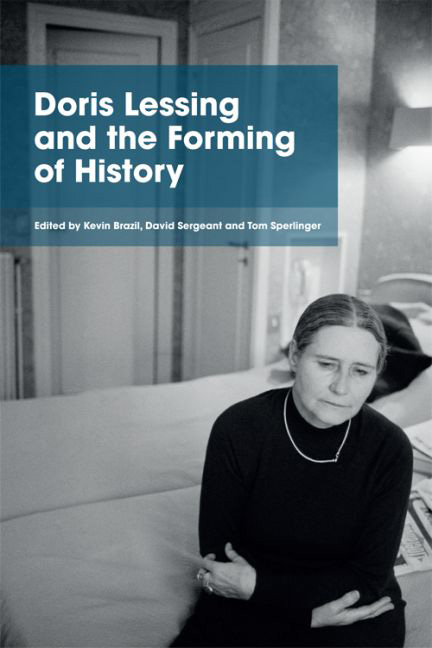Book contents
- Frontmatter
- Contents
- Acknowledgements
- Timeline
- Introduction
- 1 Early Lessing, Commitment, the World
- 2 ‘I'm an adolescent. And that's how I'm going to stay’: Lessing and Youth Culture 1956–1962
- 3 Sequence, Series and Character in Children of Violence
- 4 The Politics of Form: The Golden Notebook and Women's Radical Literary Tradition
- 5 Readers of Fiction and Readers in Fiction: Readership and The Golden Notebook
- 6 From The Grass is Singing to The Golden Notebook: Film, Literature and Psychoanalysis
- 7 ‘funny thing laughter, what's it for?’: Humour and Form in Lessing's Fiction,A
- 8 Lessing and the Scale of Environmental Crisis
- 9 Lessing and Time Travel
- 10 Lessing's Interruptions
- 11 Lessing's Witness Literature
- 12 A Catastrophic Universe: Lessing, Posthumanism and Deep History
- Select Bibliography
- Notes on Contributors
- Index
4 - The Politics of Form: The Golden Notebook and Women's Radical Literary Tradition
Published online by Cambridge University Press: 26 May 2017
- Frontmatter
- Contents
- Acknowledgements
- Timeline
- Introduction
- 1 Early Lessing, Commitment, the World
- 2 ‘I'm an adolescent. And that's how I'm going to stay’: Lessing and Youth Culture 1956–1962
- 3 Sequence, Series and Character in Children of Violence
- 4 The Politics of Form: The Golden Notebook and Women's Radical Literary Tradition
- 5 Readers of Fiction and Readers in Fiction: Readership and The Golden Notebook
- 6 From The Grass is Singing to The Golden Notebook: Film, Literature and Psychoanalysis
- 7 ‘funny thing laughter, what's it for?’: Humour and Form in Lessing's Fiction,A
- 8 Lessing and the Scale of Environmental Crisis
- 9 Lessing and Time Travel
- 10 Lessing's Interruptions
- 11 Lessing's Witness Literature
- 12 A Catastrophic Universe: Lessing, Posthumanism and Deep History
- Select Bibliography
- Notes on Contributors
- Index
Summary
For Jane Connor Marcus
‘It's a question of form.’ (Lessing 1990: 454)
Jane Ellen Harrison wrote, in 1914, ‘It has bothered me often – why do women never want to write poetry about Man as a sex – why is Woman a dream and a terror to men and not the other way around? … Is it mere convention, or propriety or something deeper?’ (quoted in Rich 2002: 2). Virginia Woolf, Harrison's interlocutor and friend, went to the deepest part of that question in her writing, one that ultimately became for her and many other women writers a matter of form. In order to document if not the dream then ‘the terror’ of men, and to make visible that which was often invisible – the bodily acts, narrative expressions, marks of the constructions and contradictions of patriarchal power – women writers had to find new forms that were not already inscribed within that very same system, and that would not lead to the reproduction of the same kind of unequal power. Doris Lessing may have given considerable effort to distancing herself from feminists, citing their ‘inflexibility’ in her own perhaps misguided fear of perpetuating the binaries that produce violence (Lessing 2001). But it is also clear that the form of The Golden Notebook (1962) exposes a deeper meditation on and deconstruction of the terror of patriarchy – from the private terrors of sexual humiliation to the public terrors of colonialism, torture and nuclear arms. Through experimental formal strategies we are shown how these terrors reinforce each other, but also how they are, or might be, subverted. By combining fiction, documentary material, political theory and memoir in The Golden Notebook, Lessing offers a nuanced reading of the connections between state violence, sexual hierarchies and political crises, while at the same time interrogating the very forms in which those histories are narrated. In this sense, Lessing's complex formal strategies are intrinsic to her complex political assertions, ones that problematise fixed notions of feminism, liberation, transnational solidarity, political commitment and history. Using textual hybridity to resist closed formal and political structures that reinscribe authority, Lessing writes women as central narrators and subjects of twentieth-century politics and history, subverting the boundaries of gender and genre so inculcated in mid-century modernism.
- Type
- Chapter
- Information
- Doris Lessing and the Forming of History , pp. 56 - 70Publisher: Edinburgh University PressPrint publication year: 2016



